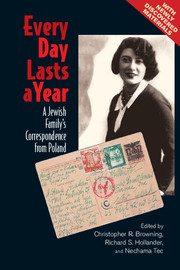Book contents
Through the Eyes of the Oppressed
Published online by Cambridge University Press: 12 October 2009
Summary
Under the oppressive German occupation, private correspondence was guided by the need not to reveal forbidden and potentially damaging information. This was particularly true for groups such as the Jews. Because they were targeted for persecution and eventually annihilation, Jews had to be careful not to reveal forbidden and potentially damaging information through their personal correspondence. Yet, even though hidden meanings in wartime Jewish correspondence are hard to decipher, careful scrutiny can yield valuable information. Such carefully extracted data offer evidence about the evolving history of this period. Potentially, too, this evidence can provide new insights into personal feelings and coping strategies of these wartime letter writers.
Mutual correspondence more precisely reflects the dynamics of interactions than do official wartime reports. Inherent wartime instabilities in themselves, however, undermine the possibility of a two-way correspondence. The set of letters that inspired this book represents only one side of a correspondence. Even though no answers to these letters survived and parts of this one-sided correspondence were lost, the available letters can enlighten us about that historical period and about the letter writers' individual responses to the circumstances around them.
Written in a politically coercive, cruel environment, the content of these personal communications grew out of a discrepancy between what the writers may have wanted to convey and what they actually said. Practically all that could be said openly were expressions about the pleasures of receiving mail and hopes for future meetings.
- Type
- Chapter
- Information
- Every Day Lasts a YearA Jewish Family's Correspondence from Poland, pp. 60 - 100Publisher: Cambridge University PressPrint publication year: 2007



